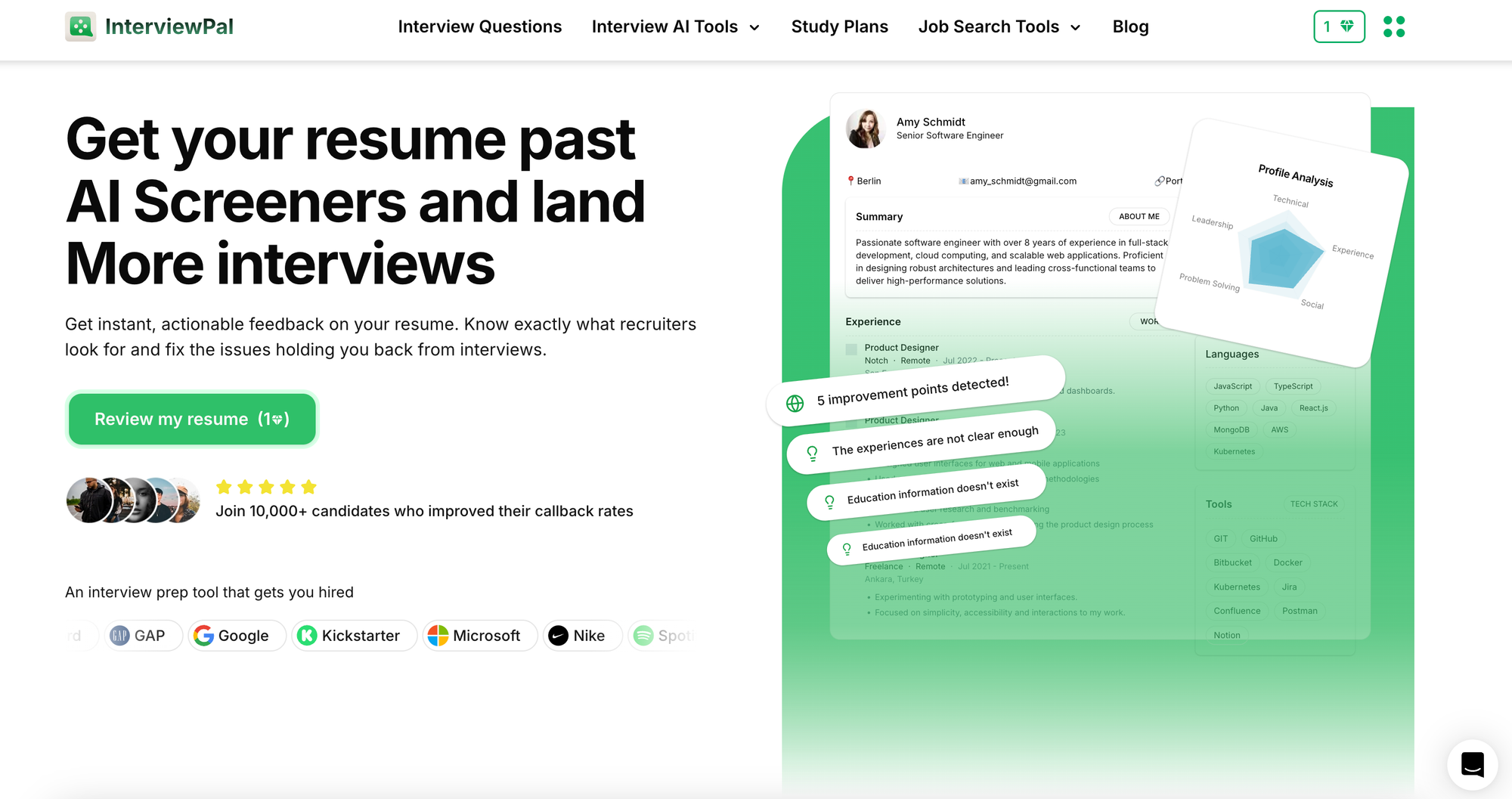What Is Your Greatest Strength? (With Real Examples)
“What’s your greatest strength?” Stop stumbling and steal proven answers from real interviews and nail this question once and for all.

Sitting in a high-stakes interview, your palms might sweat as the hiring manager leans forward and asks: “What’s your greatest strength?” It’s a common question, yet deceptively simple. Many job seekers fumble this question by either freezing up or offering a bland, generic answer. I once coached a software engineer who answered with a flat, “I’m a hard worker.” The interviewer’s silence spoke volumes, they expected more. After we reframed his answer around a genuine strength and success story, he nailed the next interview.
Why is the “greatest strength” interview question so often answered poorly? In part, because it sounds straightforward – just brag about yourself a little, right? But in reality, this prompt is a test of self-awareness and communication. The good news is that with a bit of reflection and strategy, you can deliver a response that feels authentic, confident, and relevant. Let’s break down why interviewers pose this question and how you can craft an answer that truly shines.
Why Employers Ask the "Greatest Strength" Interview Question
Every interview question has a purpose, and “What is your greatest strength?” is no exception. Employers aren’t asking to make small talk, they’re gauging a few key things. First, they want to know if your abilities align with the role. Hiring managers use this question to see if your strengths match the job’s demands and the company’s needs. For example, if you’re interviewing for a project manager role and you say your greatest strength is your artistic talent, that might not connect. They’re looking for a strength that signals you can excel in the position.
Secondly, it’s a test of your self-awareness. Employers value candidates who can pinpoint their top strengths, it signals insight and maturity. By choosing a strength that aligns with the job, you also prove you understand the role’s requirements.
Finally, how you answer reveals your communication skills and confidence. This is your chance to prove you can convey an important point about yourself succinctly and professionally. The interviewer is asking themselves: Is this person able to tell a relevant, compelling story about their strengths? If you can, it suggests you’ll communicate well on the job, too. In short, this question is a staple because it helps employers gauge your fit and future performance.
How to Identify Your True Strength
Before you can talk about your greatest strength, you have to figure out what it is. That might sound obvious, but many people initially latch onto something too generic (“I’m good with people!”) or irrelevant. To pinpoint a strength that’s both true to you and impactful for the role, try this 3-step process:
- Recall past praise: Think back on feedback from bosses or coworkers. What do people consistently praise you for? Maybe a supervisor commended your attention to detail, or colleagues often thank you for your leadership. Those recurring compliments reveal strengths you might take for granted.
- Spot patterns in your wins: Now reflect on your proudest accomplishments at work (or school). What skill or trait helped you succeed in those moments? If you led a successful marketing campaign, was it your creativity or analytical thinking that made it a hit? When you solved a tough customer issue, did your patience and communication shine? Analyze a few big wins and you might notice a pattern – a particular strength consistently driving your success. Maybe you notice, “Whenever I’ve excelled, it was because I’m very resourceful under pressure.” That insight points directly to your core strength.
- Align with the job: Finally, consider which of those strengths is most relevant to the job you’re targeting. You might be a whiz at something, but if it won’t help you succeed in that role, it shouldn’t be your answer. Review the job description and the company’s values for hints.
- Suppose the company emphasizes innovation and adaptability - and one of your top strengths is being a fast learner who embraces change. That’s a perfect match to highlight. Aligning your greatest strength with what the employer cares about shows them you’ll hit the ground running.
By the end, you’ll have a strength that is genuine (truly you) and strategic (valuable for the job). Avoid picking a trite strength just because it “sounds good”, a specific, sincere strength beats any cliché.
How to Structure Your Answer
Knowing your strength is only half the battle – you also need to deliver your answer in a way that’s clear and impactful. A reliable approach is to structure your response as Trait → Example → Result → Relevance:
- Trait: Start by stating your greatest strength clearly and confidently. Don’t bury the lede. For instance: “I’d say my greatest strength is my problem-solving ability.” Opening with a concise strength statement sets the stage.
- Example: Next, give a brief example that demonstrates that strength in action. Show, don’t just tell. Use a lead-in like, “For example,…” or “In my last role,…,” then describe a situation and how your strength made a difference. Keep it to a few sentences that outline the challenge you faced and what you did.
- Result: After explaining what you did, share the outcome or result. If possible, quantify it. Did your problem-solving save the team 20 hours of downtime? Did your organizational skills help finish a project 10% ahead of schedule? Concrete results make your strength credible. They prove you’re not just self-proclaiming – you have real examples to back it up.
- Relevance: Finally, tie your story back to why it matters for this job. You might add, “…and I’ll bring that same problem-solving mindset to this role,” or “This skill will help me hit the ground running here because ___.” Connecting the dots for the interviewer shows you understand their needs and how you’ll apply your strength to benefit the team.
When you put it all together, your answer becomes a concise success story about you. One handy formula is: “My greatest strength is __. For example, when I was __, I __. As a result, __. I’ll bring the same __ to this role.” Practice structuring your response this way so you hit all the key points without rambling. Remember to sound confident and factual – stick to what happened and what you achieved, and let those facts speak for themselves.

Real Examples of Strong Answers
Talking theory is one thing, but seeing real examples makes it click. Here are sample answers (based on actual scenarios) for different fields. Notice how each states the strength, provides a quick story, and highlights a result:
- Technology (Software Engineer): “My greatest strength is my problem-solving mindset. In my last developer role, we had a recurring system crash that no one could debug. I took the initiative to deep-dive into the codebase, identified a memory leak, and patched it within 48 hours. This fix saved about 20 hours of downtime for our team that quarter.”
- Healthcare (Nurse): “I’d say my greatest strength is empathy and patient communication. For instance, as an ER nurse, I once had a pediatric patient who was terrified and in pain. I calmly explained each step of the treatment to the child and parents to ease their nerves. They later thanked me and said they felt much more at ease during the visit.”
Healthcare (Pharmacist): “My greatest strength is my attention to detail, especially when it comes to medication safety. In a previous role at a busy community pharmacy, I caught a prescribing error where a child’s dosage was entered as an adult dose. I immediately flagged it, contacted the physician, and had the prescription corrected. It may have seemed routine, but that attention to detail likely prevented a serious adverse reaction. In pharmacy, precision isn’t optional - it’s essential.” - Education (Teacher): “My greatest strength as a teacher is my creativity in lesson planning. Last year I had a class struggling with fractions, so I designed a hands-on lesson where they learned fractions by following a simple cookie recipe. It was unorthodox, but it worked – test scores on that unit jumped 20%.”
Each of these examples shows substance over platitudes. The candidates don’t just claim “I’m great at X” - they back it up with a relevant anecdote and outcome. No matter your field, the formula is the same: choose a strength that matters for your job, then share a brief, real story that proves you’ve put that strength to work with positive results.
Even with preparation, it’s easy to slip into some common pitfalls when answering this question. Here’s what to avoid:
- Clichés and fake “strengths”: Resist answers like “I’m a hard worker” or “I’m a perfectionist.” These phrases are overused and can sound insincere. Instead of a tired cliché or a backhanded "strength," offer a specific quality that truly defines you and back it up.
- Inauthentic or exaggerated answers: Be honest. Don’t claim a strength just because you think it’s what the employer wants to hear. If you tout a skill you can’t illustrate with an example, it will fall flat. Stick to real strengths and true stories. Sincerity goes a long way; exaggeration will only hurt your credibility.
- Being vague or rambling: This isn’t the time to be overly modest or long-winded. Avoid vague statements like “I’m pretty good at teamwork” and don’t launch into irrelevant details. Share your example succinctly and confidently. Not giving a concrete example is a missed opportunity, and rambling will lose the listener’s attention. Aim for about a one-minute answer that hits the key points.
By sidestepping these pitfalls, you’ll present yourself as prepared, genuine, and self-aware – exactly the impression you want to make.
Conclusion
Done right, your answer to “What’s your greatest strength?” can become a highlight of the interview, a chance to showcase what makes you an exceptional candidate. The key is to be clear, confident, and relevant: know your top strength, back it up with a compelling real-life example, and connect it to how you’ll add value in the new role. It’s not about bragging; it’s about explaining, “Here’s something I’m great at, and here’s proof of how it made a difference.”
Before the interview, be sure to practice your answer out loud. Practice in front of a mirror, record yourself, or have a friend listen and give feedback. This will help you sound natural and ensure you hit the right points. Remember, you’ve already earned those strengths, now showcase them. Take a deep breath, share your story, and let your strengths speak for themselves.





